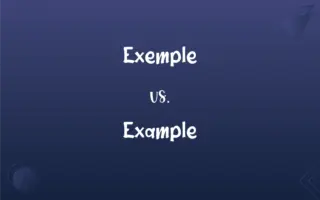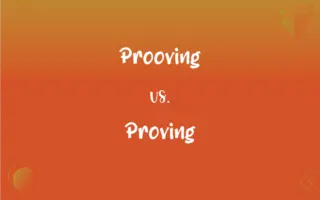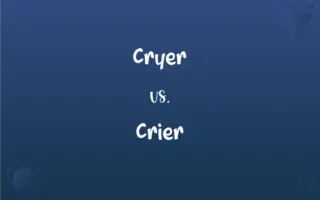Fasinates vs. Fascinates: Mastering the Correct Spelling
Edited by Harlon Moss || By Janet White || Updated on March 11, 2024
"Fasinates" is incorrect; the proper spelling is "Fascinates," meaning to draw intense interest or attract.

Which is correct: Fasinates or Fascinates
How to spell Fascinates?

Fasinates is Incorrect

Fascinates is Correct
ADVERTISEMENT
Key Differences
Note that "Fascinates" contains "c" and "s" together, which is common in English, unlike the single "s" in the incorrect "Fasinates."
Think of "Fascinates" as a combination of "face" and "nates;" both are required to make the word complete and intriguing.
"Fascinates" contains the word "sin" hidden in the middle, which can be captivating.
Remember that "Fascinates" starts with "Fas-" like "fast," both attracting attention.
Connect "Fascinates" with "fascinating," as something that fascinates you is fascinating.
ADVERTISEMENT
Correct usage of Fascinates
Her ability to remember details fasinates her teachers.
Her ability to remember details fascinates her teachers.
It fasinates me how bees communicate.
It fascinates me how bees communicate.
This book really fasinates children with its illustrations.
This book really fascinates children with its illustrations.
The idea of space travel fasinates me.
The idea of space travel fascinates me.
The way machines work fasinates many people.
The way machines work fascinates many people.
Fascinates Definitions
"Fascinates" denotes drawing irresistibly the attention and interest of someone
His storytelling fascinates listeners.
"Fascinates" implies causing to be intensely interested in something
The mystery book fascinates him.
"Fascinates" involves captivating someone's interest as if by a spell
The magician fascinates the crowd with his tricks.
"Fascinates" means to attract and hold attentively by a unique power, personal charm, unusual nature, or some other special quality
Her singing voice fascinates audiences.
"Fascinates" refers to compelling the strong attention or admiration of others
The complex puzzle fascinates the students.
To capture and hold the interest and attention of.
(Archaic) To deprive of the ability to escape or move, usually by the power of a look. Used of serpents.
(Obsolete) To bewitch.
To capture and hold someone's interest and attention.
Infl of fascinate
Fascinates Sentences
The complexity of the human brain fascinates scientists.
Ancient history fascinates me because it's so diverse.
He fascinates his audience with amazing magic tricks.
The process of making chocolate fascinates kids during factory tours.
The depth of the ocean and its creatures fascinates marine biologists.
It fascinates me how languages evolve over time.
The way birds migrate across continents fascinates birdwatchers.
Art history fascinates her; she loves learning about different art movements.
The way ancient Egyptians built the pyramids fascinates historians.
The technology behind smartphones fascinates many tech enthusiasts.
She fascinates her classmates with tales from her travels.
The diversity of cultures around the world fascinates travelers.
The resilience of nature fascinates conservationists.
The psychology behind consumer behavior fascinates marketers.
The potential of renewable energy fascinates environmentalists.
Astronomy fascinates him, especially the study of black holes.
The complexity of ecosystems fascinates environmental scientists.
How children learn and develop fascinates educators.
The process of filmmaking fascinates aspiring directors.
The strategy behind chess games fascinates enthusiasts.
FAQs
Why is it called Fascinates?
It comes from the Latin word "fascinare," meaning "to bewitch or enchant."
Which vowel is used before Fascinates?
The vowel "a" is used.
What is the root word of Fascinates?
The root is the Latin "fascinare," meaning "to enchant."
What is the verb form of Fascinates?
"Fascinate" is the base form; "fascinates" is the third-person singular present.
What is the pronunciation of Fascinates?
Pronounced as /ˈfæsɪneɪts/.
Which preposition is used with Fascinates?
"By" or "with" can be used (e.g., fascinated by/with something).
Is Fascinates a negative or positive word?
It's generally positive, implying attraction or interest.
Which conjunction is used with Fascinates?
No specific conjunction is used with "fascinates;" it depends on the sentence.
Which article is used with Fascinates?
Articles are generally not used with verbs.
Is Fascinates a noun or adjective?
"Fascinates" is a verb.
Is Fascinates a countable noun?
"Fascinates" is not a noun, it's a verb.
Is Fascinates a vowel or consonant?
"Fascinates" is a word, not a letter.
Is Fascinates a collective noun?
No, it is a verb.
Which determiner is used with Fascinates?
Determiners are not typically used with verbs.
What is the singular form of Fascinates?
"Fascinate" is the singular form.
What is the plural form of Fascinates?
This is a verb, so it doesn't have a plural form. However, the noun "fascination" has the plural "fascinations."
Is Fascinates an abstract noun?
No, it is a verb.
Is the word Fascinates imperative?
It can be, as in "Fascinate me!"
How many syllables are in Fascinates?
There are three syllables.
How do we divide Fascinates into syllables?
It is divided as fas-ci-nates.
What is the opposite of Fascinates?
Opposites include "bores" or "repels."
Is the Fascinates term a metaphor?
Not in itself, but it can be used metaphorically in speech.
What is a stressed syllable in Fascinates?
The first syllable, "fas," is stressed.
What is the first form of Fascinates?
"Fascinate" is the first form.
How is Fascinates used in a sentence?
"The way she plays the piano fascinates me."
Is Fascinates an adverb?
No, it is a verb.
What part of speech is Fascinates?
It is a verb.
What is another term for Fascinates?
Synonyms include "enchants," "charms," or "captivates."
What is the second form of Fascinates?
"Fascinated" is the second form.
What is the third form of Fascinates?
"Fascinated" is also the third form.
About Author
Written by
Janet WhiteJanet White has been an esteemed writer and blogger for Difference Wiki. Holding a Master's degree in Science and Medical Journalism from the prestigious Boston University, she has consistently demonstrated her expertise and passion for her field. When she's not immersed in her work, Janet relishes her time exercising, delving into a good book, and cherishing moments with friends and family.
Edited by
Harlon MossHarlon is a seasoned quality moderator and accomplished content writer for Difference Wiki. An alumnus of the prestigious University of California, he earned his degree in Computer Science. Leveraging his academic background, Harlon brings a meticulous and informed perspective to his work, ensuring content accuracy and excellence.


































































